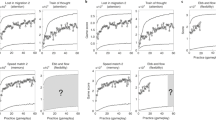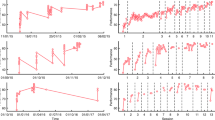Abstract
ALMOST since the beginning of the systematic study of performance experimenters had noticed the tendency for subjects to combine ‘elements’ into ‘groups’ for perceptual and motor purposes. One of the classic studies in human learning is the series of experiments on morse-learning by Bryan and Harter1, who showed some sixty-five years ago that the process of learning was arrested periodically and that ‘plateaux’ appeared in the learning curve for receiving. This they interpreted by supposing that during the plateaux subjects consolidated what they had learned previously and reorganized elements into higher order groups: from dealing with inputs letter by letter one proceeds to words, phrases and whole sentences. A similar progression was postulated for learning to send, even though no plateaux fcwere found. Their interpretation has generally been accepted but so far as we know it has never been put to the test, We have gone a little way towards remedying this defect, and wish to communicate a first set of results.
This is a preview of subscription content, access via your institution
Access options
Subscribe to this journal
Receive 51 print issues and online access
$199.00 per year
only $3.90 per issue
Buy this article
- Purchase on Springer Link
- Instant access to full article PDF
Prices may be subject to local taxes which are calculated during checkout
Similar content being viewed by others
References
Woodworth, R. S., Experimental Psychology (Holt and Co., New York, 1938).
Author information
Authors and Affiliations
Rights and permissions
About this article
Cite this article
LEONARD, J., NEWMAN, R. Formation of Higher Habits. Nature 203, 550–551 (1964). https://doi.org/10.1038/203550b0
Issue Date:
DOI: https://doi.org/10.1038/203550b0
Comments
By submitting a comment you agree to abide by our Terms and Community Guidelines. If you find something abusive or that does not comply with our terms or guidelines please flag it as inappropriate.



